Reply To Rejection Letter
Subject: Reply to Rejection Letter
Dear [Sender's Name],
I hope this email finds you well. I wanted to take a moment to express my gratitude for considering my application and for taking the time to inform me of your decision. Although I am disappointed to learn that I was not selected for the position, I genuinely appreciate the opportunity to have been a part of your recruitment process.
I want to assure you that I remain enthusiastic about the prospect of joining your esteemed organization. After careful reflection, I am even more convinced that my skills and qualifications align with your company's values and objectives. Therefore, I kindly request that you reconsider my application for the role.
I understand that the competition for such positions is intense, and I respect the decision-making process. However, I believe that my experience, expertise, and passion for the industry make me a strong candidate. Throughout my career, I have consistently demonstrated a commitment to personal and professional growth, and I am confident that I can make a valuable contribution to your team.
I would be grateful for the opportunity to address any concerns or questions that may have influenced your decision. If there is any additional information you require, or if you would like to schedule a meeting or interview, I am more than willing to provide further details about my qualifications and accomplishments.
I understand that your hiring needs may have changed or that other candidates may have been better suited for the role. Nevertheless, I respectfully request that you keep my application on file for future openings that may align with my skill set. I genuinely admire your organization's mission and vision, and I believe that a future opportunity to contribute to your team would be mutually beneficial.
Thank you once again for considering my application and for your time and attention. I look forward to the possibility of further discussing my candidacy and exploring any future prospects with your esteemed organization.
Warm regards,
[Your Name]
[Your Contact Information]
Professional Reply to Job Rejection Letter
Subject: Thank You for the Opportunity
Dear [Hiring Manager Name],
Thank you for informing me about your decision regarding the [Job Title] position. While I am disappointed to hear that I was not selected, I truly appreciate the opportunity to interview and learn more about [Company Name].
I hope to be considered for future opportunities that align with my skills and experience. Please keep my resume on file for any suitable roles.
Thank you again for your time and consideration.
Sincerely,
[Your Name]
Heartfelt Reply to Rejection Letter
Subject: Appreciation for Your Consideration
Dear [Hiring Manager Name],
I would like to express my sincere gratitude for the opportunity to interview for [Job Title]. Although I am saddened that I was not selected, I truly value the experience and insights I gained during the process.
I hope to stay connected and remain informed about future opportunities at [Company Name]. Thank you once again for your time and feedback.
Warm regards,
[Your Name]
Casual Email Reply to Rejection
Subject: Thank You for the Update
Hi [Hiring Manager Name],
Thanks for letting me know about the decision regarding the [Job Title] role. I appreciate the chance to interview and meet the team.
I’d love to stay in touch for any future openings that match my experience.
Best,
[Your Name]
Short and Quick Reply to Rejection Letter
Subject: Thank You
Dear [Hiring Manager Name],
Thank you for considering me for the [Job Title] position. I appreciate the opportunity and hope to apply again in the future.
Sincerely,
[Your Name]
Provisional Reply to Rejection Letter for Feedback Request
Subject: Request for Feedback
Dear [Hiring Manager Name],
Thank you for updating me on the outcome of the [Job Title] selection process. While I am disappointed, I would greatly appreciate any feedback you could provide to help me improve for future opportunities.
Your guidance would be invaluable and I hope to stay connected for upcoming roles.
Best regards,
[Your Name]
Formal Reply to Rejection Letter with Gratitude
Subject: Gratitude for the Opportunity
Dear [Hiring Manager Name],
I acknowledge receipt of your email regarding my application for [Job Title]. Although I was not selected, I am grateful for the professional experience of the interview process and the courtesy extended to me.
I look forward to potential opportunities in the future and will continue to follow [Company Name] with interest.
Sincerely,
[Your Name]
What is a Reply to a Rejection Letter and Why It Is Important
A reply to a rejection letter is a professional or courteous response from a candidate acknowledging that they were not selected for a position or opportunity. Purpose:
- Express gratitude and maintain a positive impression
- Show professionalism and maturity
- Keep doors open for future opportunities
- Optionally, request feedback for improvement
Who Should Send a Reply to a Rejection Letter
- Job applicants who have received a rejection
- Candidates who want to maintain a professional relationship with the company
- Professionals seeking constructive feedback or networking opportunities
Whom Should Receive a Reply to a Rejection Letter
- Hiring manager or recruiter who sent the rejection
- HR department if they manage candidate communications
- Specific interview panel members if appropriate
When Should a Reply to a Rejection Letter Be Sent
- Within 24–72 hours after receiving the rejection
- After receiving rejection via email or post
- When the candidate wants to express continued interest or request feedback
How to Write and Send a Reply to a Rejection Letter
- Start with a polite subject line
- Thank the recipient for the opportunity
- Express disappointment professionally without negativity
- Optional: Request constructive feedback
- Close with a note of gratitude and interest in future opportunities
- Send via the same medium as the rejection: email if digital, printed if letter
Formatting and Style Guidelines
- Length: Short and concise, 3–5 paragraphs for formal letters, 2–3 paragraphs for emails
- Tone: Professional, polite, and courteous
- Wording: Positive, appreciative, and forward-looking
- Style: Formal for official corporate communication, casual for familiar contacts
- Etiquette: Use proper salutations, avoid emotional language, and proofread carefully
Requirements and Prerequisites Before Sending
- Ensure the rejection is final and confirmed
- Know the recipient’s name and title
- Optional: Prepare specific questions for feedback
- Maintain a professional mindset before writing
After Sending a Reply to a Rejection Letter
- Track any response from the recruiter or manager
- Keep records of correspondence for future reference
- Use feedback received to improve future applications
- Stay connected with the company for future openings
Common Mistakes to Avoid
- Responding emotionally or negatively
- Writing excessively long or repetitive messages
- Failing to acknowledge the opportunity
- Neglecting proper grammar and formatting
- Not considering future networking potential
Elements and Structure of a Reply to Rejection Letter
- Subject line: Clear and polite (e.g., “Thank You for the Opportunity”)
- Greeting: Address the sender respectfully
- Opening: Acknowledge receipt of rejection
- Middle: Express gratitude, professionalism, and optional feedback request
- Closing: Polite sign-off, continued interest in the organization
- Signature: Full name, and optionally contact information
Tricks and Tips for Effective Reply Letters
- Keep the tone positive and appreciative
- Highlight interest in future roles without pressure
- Keep it concise and easy to read
- Send promptly to show professionalism
- Use templates for consistency but personalize each response
Compare and Contrast Reply Letters with Other Responses
- Reply to Rejection vs Non-response:
- Reply demonstrates professionalism and maintains connections
- Non-response may close doors for future opportunities
- Reply Letter vs Feedback Request Email:
- Reply letter acknowledges rejection politely
- Feedback email focuses on seeking constructive advice
FAQ About Replying to Rejection Letters
-
Q: Should I request feedback in my reply?
A: Yes, if you want to learn and improve, but do so politely. -
Q: Can I keep the reply short?
A: Yes, brevity is appreciated, especially in formal corporate communication. -
Q: Is it appropriate to stay in touch after rejection?
A: Absolutely; maintaining a professional relationship can open future opportunities. -
Q: What tone should I use?
A: Professional, courteous, and forward-looking; avoid negativity or sarcasm.
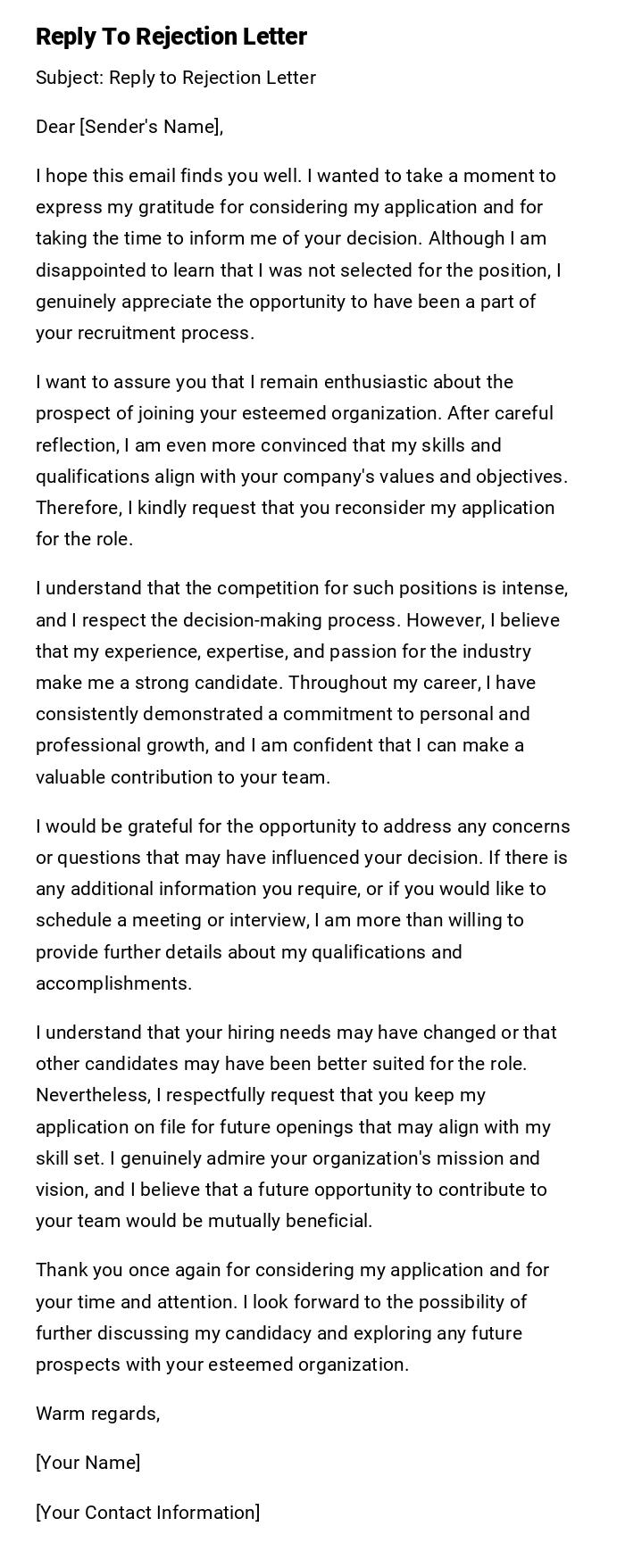
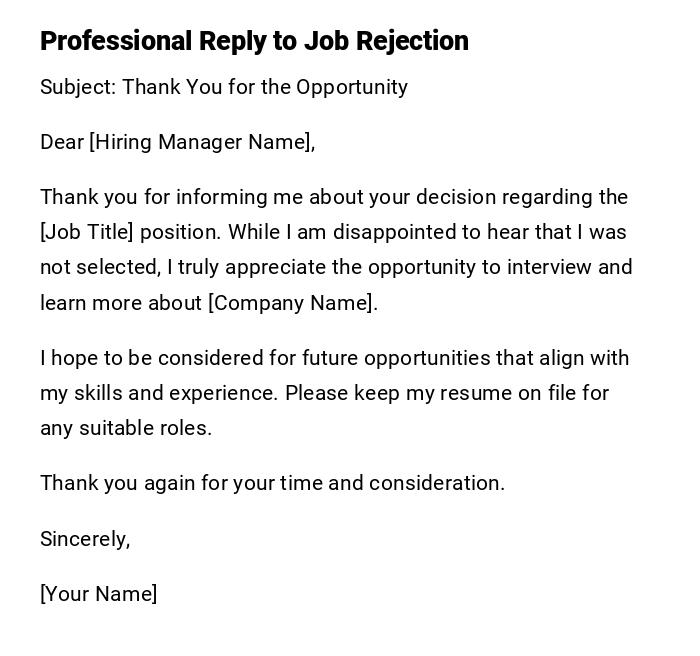
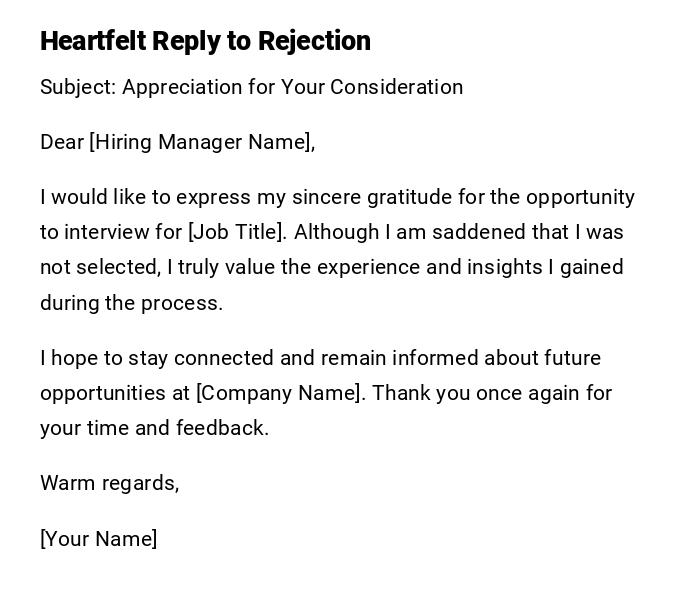
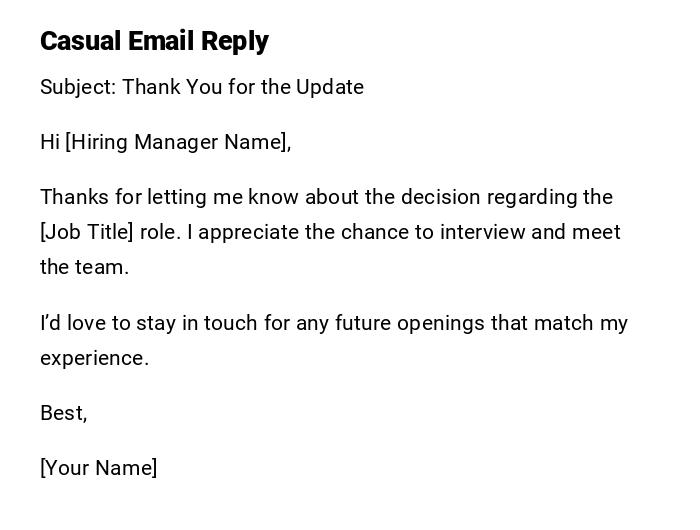
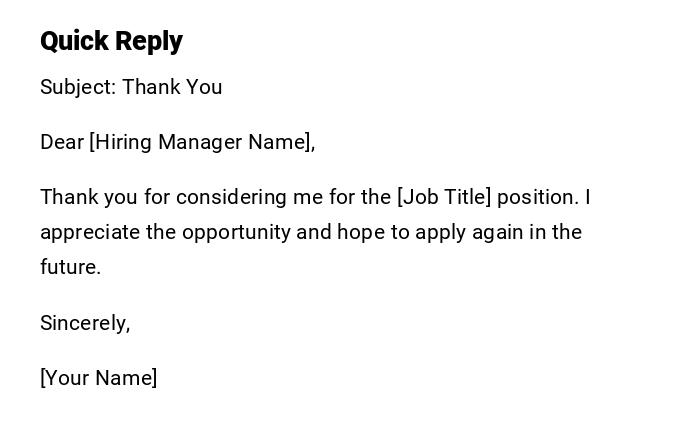
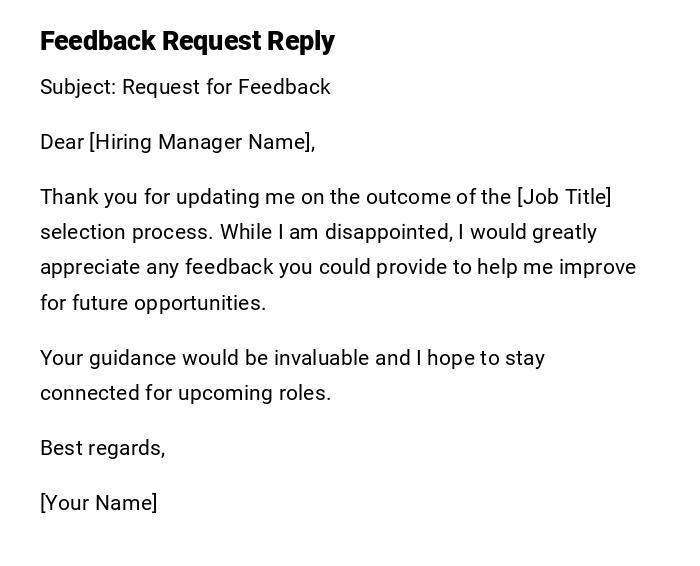
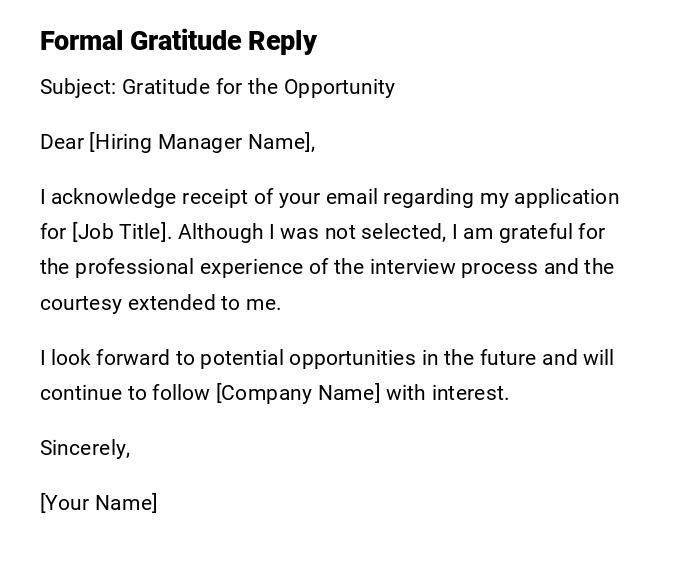

 Download Word Doc
Download Word Doc
 Download PDF
Download PDF